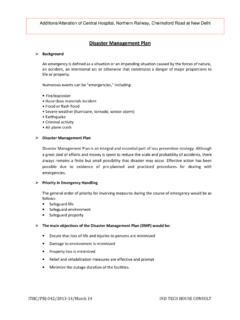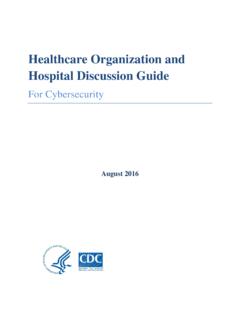Transcription of Factsheet 37 Hospital discharge - Age UK
1 Factsheet 37. Hospital discharge November 2021. About this Factsheet This Factsheet explains what you should expect from staff planning for your discharge from Hospital following NHS treatment in England. Your Hospital stay should be no longer than medically necessary and you should be able to access ongoing care and support in the most appropriate place. You may like to read other Age UK factsheets about the care and support available from your local authority social services department, funding care at home and in a care home, and NHS Continuing Healthcare. The information in this Factsheet is applicable in England. If you are in Scotland, Wales or Northern Ireland, please contact Age Scotland, Age Cymru or Age NI for advice. Contact details can be found at the back of this Factsheet . Contact details for any organisation mentioned in this Factsheet can be found in the Useful organisations section.
2 Page 1 of 28. Contents 1 Recent developments 4. 2 Introduction 4. 3 Hospital discharge key steps 4. 4 Going into Hospital 6. Planned admissions 6. Emergency admissions 7. 5 Your Hospital stay 8. Your rights in Hospital 8. Making decisions about treatment and care 9. Involving your family or carer 10. Supporting a patient living with dementia 10. Benefits while in Hospital 11. If your treatment is not funded by the NHS 11. 6 Arranging discharge 12. discharge to assess 12. 7 Assessing need for long-term support 13. Social care needs assessment 13. Eligibility for care and support 13. Assess your carer's needs and eligibility for support 14. Planning and arranging care 14. When your local authority has a duty to meet your needs 14. When you must make your own care arrangements 15. If your needs do not meet eligibility criteria 15.
3 NHS Continuing Healthcare 16. 8 Paying for social care 17. Paying for care at home 17. Paying for care in a care home 17. 9 Support options 18. Age UK Factsheet 37 November 2021. Hospital discharge Page 2 of 28. Short term support to maximise your recovery 18. NHS services 19. Going home 20. Moving to a care home 21. Palliative care support 22. Sheltered housing or adapting accommodation 22. 10 Reviewing your care and support needs 22. 11 Providing feedback on discharge 23. 12 Raising concerns or making a complaint 23. 13 Hospital discharge legislation and guidance 24. Useful organisations 25. Age UK 27. Support our work 27. Age UK Factsheet 37 November 2021. Hospital discharge Page 3 of 28. 1 Recent developments All acute hospitals in England have followed the same discharge process since the onset of the coronavirus pandemic in March 2020 and will continue to do so until the 31 March 2022.
4 2 Introduction If your Hospital admission is planned, your stay and abilities on leaving are more predictable. Planned NHS-funded treatment is generally provided in an NHS Hospital but may be provided in a private Hospital . An emergency admission brings more uncertainty, but staff should follow steps to ensure your stay is no longer than necessary, and you receive the right care and support, once a doctor says you are ready to leave. This Factsheet covers NHS-funded treatment in England, with the focus on managing your discharge following an emergency admission. 3 Hospital discharge key steps Staff should: 1 Explain and provide information about the discharge process in a format you can understand and engage with, soon after admission. 2 Start discharge planning once you have a diagnosis and treatment plan.
5 Ask about and take account of your home circumstances, involving you (and your carer or family as appropriate) at all stages. 3 Review your needs regularly and share the criteria the doctor will use to decide you are ready to be discharged, where they think you are likely to be discharged to, and when. The aim is to discharge you on the day a doctor says you are clinically ready to leave Hospital . 4 If you have no formal care needs, facilitate your discharge home. 5 If likely to need ongoing support, appoint a case manager to arrange where you are discharged to. This may be to your own home or a residential setting such as a community Hospital or care home. There should also be settle-in support, if needed, when you arrive. 6 If you could benefit from support to recover further, arrange an assessment the same or next day to identify and agree a short-term recovery and support plan with you.
6 Review progress regularly, followed by consideration of your long-term care needs. 7 If not likely to recover further, conduct an assessment of your long-term care needs and discuss how these might be met. 8 If your partner or carer will provide ongoing care and support on discharge , explain their right to a separate carer's assessment. The flow chart on the following page summarises this journey. Age UK Factsheet 37 November 2021. Hospital discharge Page 4 of 28. Hospital discharge pathway Patient admitted Discuss and agree treatment. Carer/family Staff explain discharge to assess' As appropriate: process and provide information. Keep informed of issues Share likely discharge date and that affect them. criteria doctor will base discharge Assess carer's ability to decision. provide support. Start discharge planning that allows Explain right to local patient to move to a more suitable authority carer's location on day doctor says no longer assessment.
7 Needs acute Hospital care. Patient almost ready for discharge Limited assessment to confirm suitable location and can meet immediate needs. No n eed for form Home al s u ppor t GP/other NHS services and/or Does assessment home from Hospital Could patient recover show eligible need for support further, if offer formal No No long term social care or support? support? few weeks domestic help and Yes info on local services and ways to maintain your Provide recovery independence. support at home or residential setting for up to four weeks, within this time also assess long term needs. s Yes Ye Does assessment show eligible need for long term social care Home with Care home Hospice support? support Residential Palliative No Personal/NHS or care care Nursing Home and/or Aids/adaptations Info on local services or and ways to maintain Palliative care your independence.
8 Age UK Factsheet 37 November 2021. Hospital discharge Page 5 of 28. 4 Going into Hospital Planned admissions A GP referral to a Hospital consultant results in an outpatient appointment. The referral letter should explain, and the Hospital should respond to, any communication needs you have. Appointment letters and information can be sent in large print, easy read, Braille, or audio. The Hospital must ensure you can take an active part in discussions at your appointment and may need to arrange a British Sign Language interpreter, lip reader, deaf blind interpreter, or advocate. If English is not your first or preferred language, the Hospital can invite a registered interpreter to assist you. The Hospital may ask you to consider a telephone or video appointment. The consultant may want to arrange further tests to reach a diagnosis before discussing treatment options with you.
9 Questions to ask the consultant at an outpatient appointment Do I need further tests? If so, what are they for? Where and when can I. have them? How long before I get the results and how will I get them? What treatment would you recommend and why? Under the Equality Act 2010, it is unlawful for doctors, without good or sufficient reason, to offer or provide inferior treatment or refuse to provide treatment at all, solely because of your age. Age can play a part but staff should take into account your biological' age (how well your vital organs and systems are working), not simply your chronological' age (your age in years). What are the benefits, side effects, risks and success rates of each treatment being proposed? How frequently is the treatment required? What improvements can I expect with each treatment option?
10 When might I start to notice improvements, and can I expect a full recovery? What would be the consequences of doing nothing or waiting a while? If I need further tests or treatment, will I be an inpatient or day patient? If I am an inpatient, how long might I need to wait for treatment to begin and what is the likely length of my stay? Is there anything I can do before my treatment, while I am in Hospital , and when I go home to support my recovery? How long before I know if the treatment is working or has worked? When will I be able to go about life as usual? Will I need help at home? If so, what type of help and for how long? Tell staff about your home environment and any help you currently receive. The more they know, the easier it is to ensure you have the right support on leaving Hospital .

















